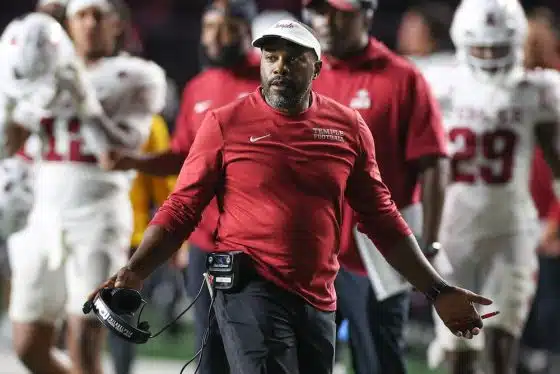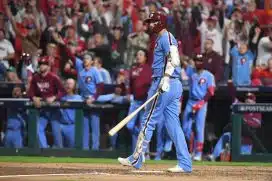Flyers
Flyers 5: Takeaways from Thursday’s Flyers-Penguins Game
By Kevin Durso, Sports Talk Philly editor
It went exactly as imagined. The Flyers took the ice missing six players due to COVID protocols and more due to injury. Despite that, it was game on against a Penguins team that is getting healthier by the day and continues rolling in spite of it all.
The end result was a 6-2 defeat, certainly no surprise given the circumstances. But it also goes down as another embarrassing showing in front of the home crowd. It’s another game where the Flyers fell behind early and never recovered. And it left the interim head coach with some harsh words regarding compete level in his postgame remarks.
Here are five takeaways from Thursday’s game.
1. “Go Down Swinging”
Let’s just dive right into it. Brief synopsis of the game for you: the Flyers and Penguins skated through a scoreless first 10 minutes before the opportunity finally came for Pittsburgh. They got a power play, then scored on it. From there, they tacked on two more goals in the first period. The Flyers pushed a little in the second, getting the only goal of the period, but never got any closer, allowing three more goals in a row in a three-minute span, then adding on a garbage-time power-play goal to cap the scoring.
Why is all of that significant? Because once the Flyers finally did fall behind, thanks to the special teams goal, the wheels seemed to come off. It’s happened plenty of times before this season, but it was essentially game over from there.
Sure, the team was playing shorthanded. They had six players in COVID protocol, including four regulars. They have three more regulars out with injury. But one goal at 12:21 of the first period seemed to already be the dagger. Pack it in. Go home. Try again next time.
Here’s what interim head coach Mike Yeo said postgame.
“Probably what the message is going to be is, in all honesty, we were missing some guys. So, how do you compensate for that? Well, you up your compete level. You dig in harder into your team game, and obviously you have to show more resilience, heart, whatever you want to say. You look at tonight and I thought we had an okay start. Then, next thing you know, they score a goal. It was just after that whether we didn’t believe that we could win or whatever the case was, we were not good enough. So for me, the biggest message, more than anything – we can talk about X’s and O’s and gameplans and everything else – it’s just about how hard you fight. We can look at where we’re at in the season, and we can just sort of accept our fate for the rest of our way and say maybe it’s not our year, bad luck, this and that. You can do the same in the game or you can fight and you can determine your own fate, regardless of what the circumstances are. There’s gonna be times where maybe you don’t get the result you’re looking for, but you’re gonna go down swinging if that’s the case, and I didn’t think we did that tonight and I think that’s the biggest thing we have to address.”
There’s a lot to unpack there, but the two things that stood out to me were the parts about “accepting your fate” and “going down swinging.”
Yeo has a point on accepting your fate. Everyone, whether it be fans, experts, media members, whomever, can have their minds made up on what this season will become. That’s what we do from our perspective. As players and coaches, there’s a level of investment. There’s elements of it you can control.
At 34 games into the season, there is still a long stretch of highway to go. Forget what the standings say for a moment. There are 48 games left on the team’s season. If you are just accepting your fate at this stage, what are you even playing for?
2. “Mindset and Determination”
There is a common theme to most games in the NHL: score first and you tend to find a way to win more times than not. It prevents you from chasing the game and keeps you involved. After 34 games on the season, the split for the Flyers in this department is dead even: 17 games scoring first, 17 allowing the first goal.
When scoring first, the Flyers are 11-2-4. That’s as you would expect. They win more often than they lose and they almost always find themselves in a position to at least earn a point in the standings.
But when they allow the first goal, the Flyers are 2-13-2. That’s a sign of the “accepted fate” Yeo was talking about.
For comparison's sake, look at the NHL’s best team in the league right now, the Tampa Bay Lightning. Even the best teams in the NHL follow a similar script. The percentages of scoring first or allowing the first goal tend to even out over the course of a season. The difference is that elite teams like Tampa Bay don’t let it derail their mission.
Tampa Bay has scored first in 19 games this season, posting a 14-1-4 record. But when they have allowed the first goal, they are 9-7-1 in 17 games.
More from Yeo:
“This is something I’m not looking at just tonight, that’s for sure. I believe that there’s an element of it that you have to show your determination and continue to fight, and not just to say that it was not our night tonight. Can’t just say it’s not our season this year. I also believe that there is an approach you have to take in that situation where you can’t just give up a goal and say ‘it’s all or nothing, we’ve got to get the next goal’ and then give up two or three more. There’s also an approach to it, but I think, more than anything, it’s mindset and determination. We have a chance to prove ourselves here and take advantage of that.”
This relates back to last season and the common snowball effect that took place within games. All it seemed to take was one mistake, one thing that doesn’t go your way, and the rest would follow with unstoppable force.
It’s things of that nature that influence what was seen during the 10-game losing streak. It doesn’t happen in the first game per se. You may lose that game by some unfortunate luck without the snowball effect. But as the games pile up, you can lose confidence and the mindset and determination that Yeo refers to quickly.
It happened in the game against Carolina on Black Friday, when the Flyers had leads of 1-0, 2-1, and 3-2. It happened against the Devils and Rangers and Lightning and Avalanche in the games that followed, turning a four-game losing streak into nine and resulting in a head coach being fired. It’s happening again now, as the Flyers follow up a seven-game points streak, capped off with an overtime loss, with another four-game losing streak.
3. Turning Point
Speaking of that turning point, it happened in the first period.
The Flyers were down 1-0, but looked like they had a goal when the puck was jarred free from Tristan Jarry’s pad and through the crease before being knocked in by Joel Farabee. But the whistle had sounded before the puck was in the net, meaning there would be no goal on the play.
Not long after that, Pittsburgh added two goals in a span of 1:21 to get the game out of hand and the Flyers never came close to getting back into it, despite a goal from that line scored by Cam Atkinson in the second period.
4. Against the Odds
There was certainly some pre-game debate about whether this game should have even taken place or not. After all, the Flyers were heavily shorthanded, dealing with a COVID outbreak that forced four players to travel home from the final stop of their road trip separately, and who knows if more names are to come as a result.
Factor in that the team they just played earlier in the week, the Anaheim Ducks, had their game called off after adding five names to the COVID protocol list. There seems to be no rhyme or reason to the way postponements are handled.
There were also plenty of other things going against the Flyers. Forget the Penguins overall winning streak, which we’ll dive into more in a moment, they had some already ridiculous recent numbers coming in to counter some not so quality results for the Flyers.
Bryan Rust, who returned from injury at the start of the new year, has essentially morphed into Wayne Gretzky in the three games since. Or maybe we’ll keep it with the Pittsburgh theme and say Mario Lemieux. Either way, in the three games since his return, he has scored seven goals and added four assists for 11 points. Prior to this three-game stretch, he had just two goals and nine points in 12 games.
Additionally, Tristan Jarry stayed on brand for his recent stretch. He had six straight wins, including victories in five straight starts entering this game, but had also allowed just eight goals over the previous four games. The Flyers, as a team, had scored nine in their last four.
5. Going Streaking
It’s already been mentioned several times over the last 24 hours, but the Penguins have now completed the opposite of the Flyers streak. They have 10 straight wins, going Dec. 4. Their last loss was on Dec. 1, a 5-2 decision to Edmonton.
What that has done is really separated them from the pack. The Penguins now sit at 45 points in the standings, right back in the thick of the Metropolitan Division race with the Rangers, Hurricanes, and Capitals, each three points or fewer ahead. While the next closest team to the Penguins, the Boston Bruins, have three games in hand to make up six points potentially, they still sit nine back overall, which gives Pittsburgh plenty of breathing room at the moment.
Meanwhile, the Flyers remain four points out of the final playoff spot, but it is basically more of an illusion to consider them in the playoff race. The same six possible points in hand for Boston could knock them to 10 points behind, not to mention two other teams already ahead and two more with plenty of games left to make up the ground needed to pass them.
It doesn’t help matters that the Flyers are on a current four-game losing streak. They will have to face the San Jose Sharks on Saturday with likely the same lineup. And then they have Carolina, Boston, and the Rangers all on the schedule for the following week. Another eight-game losing streak is certainly not out of the question given the talent and performance disparities between the Flyers and those opponents.












































